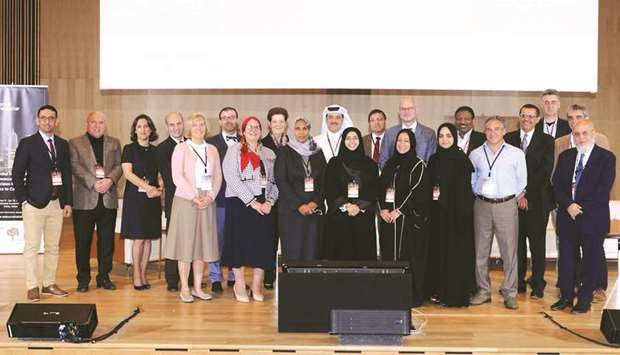Weill Cornell Medicine – Qatar (WCM-Q) has held a three-day conference on congenital dystrophies and the precision medicine associated with neuromuscular disorders, with participants hearing from world-leading experts.
The event involved experts from the region, Europe and the US lecturing on a variety of topics surrounding neuromuscular disorders, with particular reference to congenital dystrophies and myopathies.
These conditions are prevalent in Qatar and the wider Gulf, with the conference also focusing on the potential for personalised medicines and new, emerging treatments as well as the challenges in implementing the therapies.
The third day of the conference was open to the public and allowed members of the community and patients’ families to meet and discuss issues with the international experts and local physicians.
The event was organised by Dr Alice Abdel Aleem, assistant professor of research in neurology, and assistant professor of research in neuroscience at WCM-Q, and consultant in clinical genetics at Hamad Medical Corporation.
“It has been fascinating to hear of the latest therapies that are being developed and to learn from some of the foremost authorities on neuromuscular disorders in the world,” Dr Aleem said.
“Because of the prevalence of consanguineous marriages in the Gulf, the region has a relatively high incidence of congenital disorders, so the third day of the conference was particularly important as it allowed the community to discuss issues with experts face-to-face.”
International speakers at the conference included Dr Volker Straub, deputy dean of the Institute of Translational and Clinical Research at Newcastle University in the UK and director of the MRC Centre for Neuromuscular Diseases in UK, who spoke about magnetic resonance imaging in diagnosing muscle disease.
Dr Elizabeth Ross, director of the Centre for Neurogenetics at Weill Cornell Medicine in New York, who spoke about features of the human brain associated with congenital muscular dystrophies.
Dr Carsten G Bönnemann, chief of the neuromuscular and neurogenetic disorders of childhood section at the Porter Neuroscience Research Centre in Maryland in the US, who discussed emerging therapies and the development of clinical trials in congenital muscular dystrophies.
Dr Rita Horvath, director of clinical genetic research into rare neurological disorders at the University of Cambridge, delivered a lecture om mitochondrial diseases.
Dr Christophe Beroud from Aix-Marseille University Medical School in France, spoke about the sequencing diagnostic tree he has invented in his laboratories which enable the simultaneous diagnosis of a group of congenital muscular dystrophies.
Dr Andoni Urtitzberea, director of the Summer School of Myology in Paris, gave a talk about his 20 years’ journey investigating neuromuscular disorders.
Dr Gustavo Dziewczapolski, the scientific director of the Cure Congenital Muscular Dystrophy Foundation in the US, outlined how the patients’ advocacy organisation can take a role in influencing the decisions made by health authorities.
Speakers from Qatar, included Sheikh Dr Mohamed bin Hamad al-Thani, director of the Public Health Department at the Ministry of Public Health, who spoke to delegates about how the burden could be reduced on families who have relatives with congenital dystrophies.
Dr Mahmoud Fawzi, senior attending physician in paediatric neurology at Sidra Medicine, presented the epidemiology of neuromuscular disorders in Qatar, while Dr Khalid Ibrahim, senior attending physician in paediatric neurology at Sidra Medicine, outlined the types of spinal muscular atrophy found in Qatar.
Dr Nahla Afifi, director of Qatar Biobank, detailed the work they carry out and explained how the resource has an important role to play in future research.
Recommendations made at the conference included the involvement of the public and primary healthcare sectors in raising awareness of congenital dystrophies and optimising early diagnosis.
It was also suggested that Qatar should be involved in upcoming clinical trials for a specific type of congenital muscular dystrophy because of its prevalence within the country, and that a registry should be created for the neuromuscular disorders found here.

Participants at the Weill Cornell Medicine u2013 Qatar conference.
